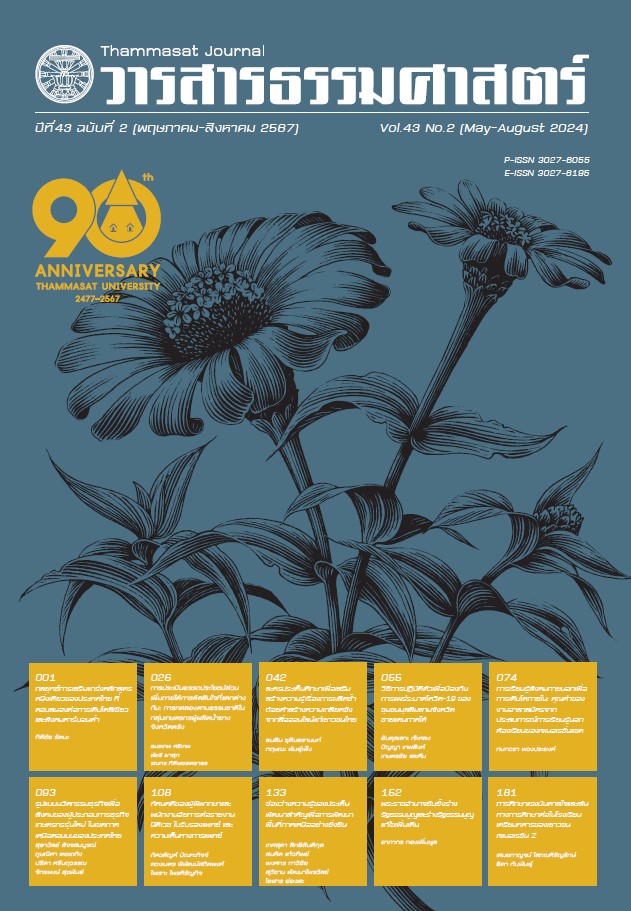Gap Analysis of Key Development Issues for Sustainable Development in Northern Thailand
Main Article Content
Abstract
This study aimed to explore key development issues in Northern Thailand under sustainable development goals and to conduct a gap analysis on these issues to establish research directions for sustainable development in the region. To identify key development issues, document analysis was used to develop questionnaires addressing the economy, society, and environment. Forty questionnaires completed by experts were analyzed to prioritize key development issues based on significance scores. The significance score was calculated as the average of severity score plus the average of the impact score minus the average of the policy effectiveness score and the average of the policy adequacy score. A workshop was also organized to verify, discuss, and conclude the key development issues with experts. In addition, document analysis was used for the gap analysis of the key development issues, which were classified into knowledge discovered, knowledge required, and research directions for development. Another workshop was organized to verify, discuss, and conclude the gap analysis with experts. The result indicated four key development issues and their research directions: 1) resource allocation and community economy – database updates of resources and agricultural systems, decentralization of resource management, adaptation of the young generation to agricultural sector, innovation in processing and distributing agricultural products, and the development of a learning ecosystem; 2) PM, forest fire, and environment – database updates of PM, policy and decentralization of resource management, land management to reduce forest fires, and establishing cooperation with Asian countries; 3) good governance – policy obstacles, good governance law and decentralization, participatory action research for developing a prototype area of decentralization to local community, and good governance; and 4) education system - policy and structure of education, participatory action research for learning how to develop communities, use of technology for learning innovation, suitable educational design for communities, and the development of education personnel.
Article Details
References
เกศสุดา สิทธิสันติกุล, สมคิด แก้วทิพย์, สุวิชาน พัฒนาไพรวัลย์ และพงศกร กาวิชัย. (2564). แนวโน้มสถานการณ์และทิศทางการพัฒนาที่ยั่งยืนเชิงยุทธศาสตร์สำหรับภาคเหนือ. วารสารวิชาการวิทยาลัยบริหารศาสตร์, 4(4), 1-15.
เจษฎา มิ่งฉาย, สิริวดี พรหมน้อย, สุดคะนึง ณ ระนอง, นินุช บุณยฤทธานนท์ และศิลปกร อินทะสอน. (2563). ระบบบริหารจัดการงานวิจัยของมหาวิทยาลัยเพื่อการพัฒนาพื้นที่: ข้อเรียนรู้เพื่อการยกระดับคุณภาพ. วารสารวิจัยเพื่อการพัฒนาเชิงพื้นที่, 12(4), 237-256.
ญานิศา แก้วดำ และเจจิรา ราชตบุตร. (2561). การวิเคราะห์ช่องว่างคุณภาพการให้บริการศุลกากรด้วยเครื่องมือคุณภาพ SERVQUAL กรณีศึกษา: ศึกษาด่านศุลกากรเชียงของ. [โครงงานวิศวกรรมศาสตร์]. มหาวิทยาลัยธุรกิจบัณฑิตย์.
นนท์ นุชหมอน. (2563). ศึกษาวิเคราะห์ช่องว่าง (Gap Analysis) ของงานวิจัยและแนวทางถ่ายทอดองค์ความรู้จากงานวิจัยด้านเกษตร เทคโนโลยี และอาหารของประเทศไทยในอนาคต. [รายงานวิจัยสำนักงานศูนย์วิจัยและให้คำปรึกษาแห่งมหาวิทยาลัยธรรมศาสตร์]. มหาวิทยาลัยธรรมศาสตร์.
นพพร จันทรนำชู และพรรณ์ธิดา เหล่าพวงศักดิ์. (2564). พลวัตของความรู้ทางพัฒนศึกษาและข้อเสนอเพื่อการพัฒนาที่ยั่งยืน. วารสารศึกษาศาสตร์ มหาวิทยาลัยศิลปากร, 19(1), 40.52.
พัชราภรณ์ ดวงชื่น. (2561). ผู้นำองค์กรในโลก VUCA. วารสารมหาวิทยาลัยคริสเตียน, 24(3), 450-458.
พระครูวินัยธรจักรี ศรีจารุเมธีญาณ, ภักดี โพธิ์สิงห์ และสัญญา เคณาภูมิ. (2559). ปรัชญาการศึกษาของไทยกับสังคมโลกไร้พรมแดน. วารสารวิชาการแพรวากาฬสินธุ์, 3(1), 117-136.
สำนักงานสภาพัฒนาเศรษฐกิจและสังคม. (2562, กรกฎาคม). แผนพัฒนาภาคเหนือ พ.ศ. 2560-2565 ฉบับทบทวน. https://www.nesdc.go.th/ewt_w3c/ewt_dl_link.php?nid=8533
อาวรณ์ โอภาสพัฒนกิจ, จิราพร กุลสาริน และถาวร อ่อนประไพ. (2561). รายงานวิจัยฉบับสมบูรณ์การพัฒนาศูนย์ข้อมูลและเครือข่ายวิจัยพื้นที่ภาคเหนือตอนบนเพื่อการวิจัยและการขับเคลื่อนงานวิชาการรับใช้สังคม. กรุงเทพฯ: สำนักงานกองทุนสนับสนุนการวิจัย.
Ardaya, A.B., Evers, M., & Ribbe, L. (2019). Participatory approaches for disaster risk governance? Exploring participatory mechanisms and mapping to close the communication gap between population living in flood risk areas and authorities in Nova Friburgo Municipality, RJ, Brazil. Land Use Policy, 88, 104103.
Billsberry, J. (1998). Gap analysis: exploring techniques of analysis and evaluation in strategic management. London: Prentice Hall.
Fleming, A., Wise, R.M., & Hansen, H., & Sams, L. (2017). The sustainable development goals: a case study. Marine Policy, 86, 94-103.
Gray, D.E. (2007). Doing research in the real world. (2nd ed.). London: Sage Publication Inc.
Keahey, J. (2021). Sustainable development and participatory action research: a systematic review. Systemic Practice and Action Research, 34(3), 291-306.
Kerkhoff, L.V., & Lebel, L. (2006). Linking knowledge and action for sustainable development. Annual Review of Environment and Resources, 31, 445-477.
Koo, B., Na, J-II., Thorsteinsson, T., & Cruz, A.M. (2020). Participatory approach to gap analysis between policy and practice regarding air pollution in Ger areas of Ulaanbaatar, Mongolia. Sustainablility, 12(8), 3309.
Purvis, B., Mao, Y., & Robinson, D. (2019). “Three Pillars of Sustainability: In Search of Conceptual Origins.” Sustainability Science, 14(3), 681-95.
Renzi, A.B., & Freitas, S. (2015). The Delphi method for future construction. Procedia Manufacturing, 3, 5785-5791.
United Nations. (2016). The sustainable development goals report. Retrieved 20 December 2022, from https://shorturl.at/YRxps
Whyte, W.F.E. (1991). Participatory action research. Thousand Oaks, California: Sage Publication.
Zeithaml, V.A., Bitner, M.O., & Gremler, D.E. (2009). Services marketing: integrating customer focus across the firm. New York: Mcgraw-Hill/Irwin.
Zeithaml, V.A., Bitner, M.J., & Gremler, D.D. (2010). Services marketing strategy. Wiley International Encyclopedia of marketing.

